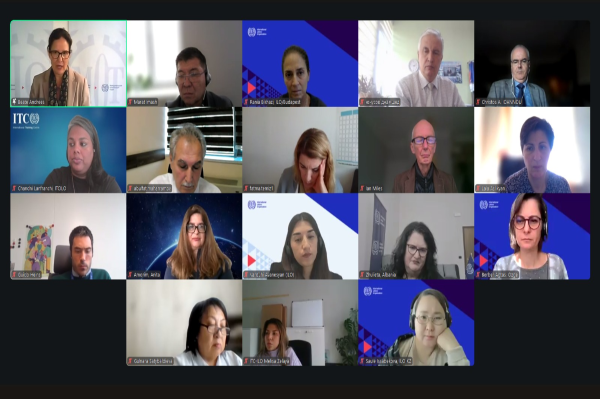
The road from COP29 in Baku to COP30 in Belém is more than a transition between summits—it is a critical bridge where lessons learned must translate into actionable strategies. South-South and Triangular Cooperation (SSTC) is at the core of this process, offering the solidarity, peer learning, and innovation needed to turn Nationally Determined Contributions (NDCs) into pathways for a just, inclusive, and gender-responsive transition.
At the Regional Knowledge-Sharing Meeting, held virtually on 1-3 October 2025, representatives from over 30 countries across Europe, Central Asia, and beyond engaged in dialogue that reflected the tripartite spirit of the ILO. Governments, employers, and workers shared their experiences in integrating climate ambitions with decent work priorities—ensuring that climate commitments are not abstract targets but tangible opportunities for fairer, more resilient societies. The exchange underscored that peer-to-peer learning is indispensable for aligning national policies, strengthening accountability in NDC implementation, and ensuring comparability across regions of the Global South.
Social dialogue was consistently highlighted as the linchpin of success. If climate change represents the storm, then dialogue is the umbrella societies must hold together. By bringing workers, employers, and governments into structured negotiation, social dialogue transforms climate anxiety into concrete action, turning conflicting positions into shared solutions strong enough to be embedded in national strategies and international commitments. It is through dialogue that climate action gains legitimacy, inclusivity, and durability.
The meeting also demonstrated how SSTC connects diverse experiences:
-
From Kyrgyzstan, where trade unions and government are developing joint positions for climate negotiations, to Uzbekistan, where green jobs centres are driving sectoral transformation.
-
From Armenia’s integration of just transition in regional development strategies to Kazakhstan’s focus on occupational safety and health in the context of climate resilience.
-
From Brazil’s tripartite platforms on energy and labour to the Amazon’s bioeconomy programmes protecting biodiversity while creating livelihoods.
These examples show how South-South cooperation scales up innovation, facilitates mutual learning, and ensures that workers, women, youth, and vulnerable groups are not left behind in the transition.
As we prepare for COP30 under Brazil’s Presidency, the priority is clear: the credibility of climate action rests not only on ambitious NDCs, but on the ability of countries to implement them through social dialogue, peer learning, and South-South cooperation. This bridge from Baku to Belém must therefore be built on knowledge-sharing, institutionalized partnerships, and practical experiences that connect climate goals with decent work, social justice, and sustainable development.
In doing so, the region—and the wider Global South—can demonstrate that just transitions are not theoretical aspirations but lived realities, negotiated collectively, and delivered inclusively.

